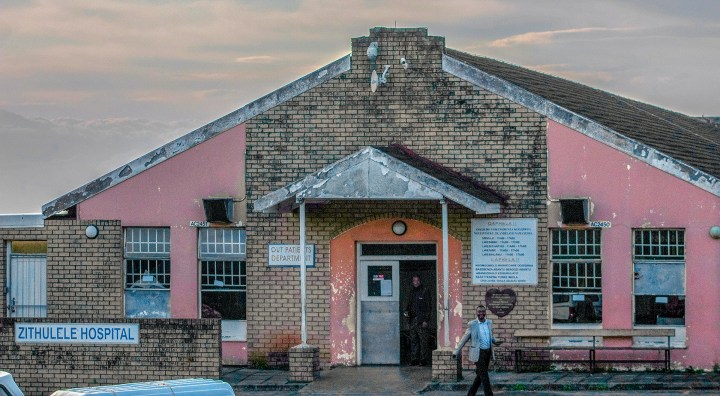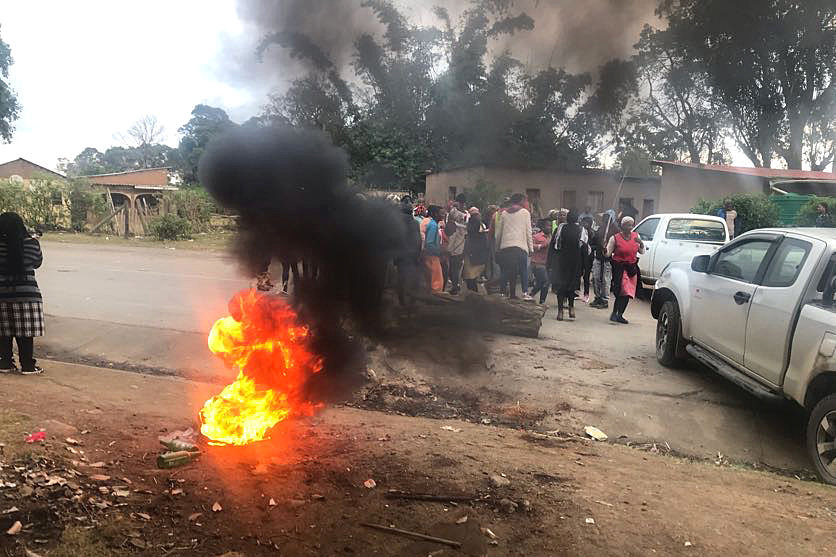HOSPITAL ON THE EDGE, PART THREE
Collateral damage — declining care, victimisation and protests at Zithulele

‘We feel like the CEO has taken us 10 years back in 10 months,’ said a doctor of the conflict that has seen Zithulele Hospital’s status as an outstanding district hospital come into peril after the strict application of the Eastern Cape Department of Health’s policy brought conflict and fear to a rural community.
The conflict over the acclaimed rural Eastern Cape hospital in Zithulele in Mqanduli culminated in a partial shutdown on 21 July. Calling for the recently appointed hospital CEO Nolubabalo Fatyela to leave, nearly 300 community members gathered outside the hospital. Protest leaders say police violently dispersed the shutdown without warning, using tear gas and rubber bullets and injuring dozens.
“From early on this year, it was just so clear that [Fatyela] doesn’t care about the patients and that she doesn’t want to take input from anyone,” said a doctor who spoke on condition of anonymity out of concerns of victimisation. “We feel like the CEO has taken us 10 years back in 10 months … this is the kind of care we used to offer 10 years ago.”
In reaction to this decline, community members organised a series of protests. Their petition reads: “The new CEO must go because her arrival has devastated Zithulele.”
After two earlier protests, on 5 July, protesters, including community members who are also employees of the NPO Jabulani Rural Health Foundation, demonstrated outside the hospital.
“They were protesting not in the capacity of Jabulani employees but in their capacities as private citizens of South Africa, as individuals,” said a member of Jabulani’s leadership.
The next day, Fatyela gave Jabulani 24 hours to leave the hospital, in violation of the conflict clause in their memorandum of understanding. Since Jabulani was founded by Drs Ben and Taryn Gaunt and Karl and Sally le Roux in 2007, it has provided support in the form of translators, equipment, HIV counsellors, medication distribution, transport funds, supplies and other services. These have now ended.
Two and a half weeks later, protesters organised their largest demonstration yet, about 270 strong. After acquiring permission to protest, they shut down the road outside Zithulele and burnt wood and tyres. Protesters say they only allowed patients, doctors and nurses through.
Protest leaders say that after delivering a petition, they tried to disperse the gathering. However, many refused to leave, saying: “We will leave if the CEO leaves.” At noon, while leaders were still addressing the crowd, a protest organiser said: “There was no warning. The first thing was bang, bang, there was tear gas, I saw some people firing rubber bullets. And then we just dispersed.”
Eastern Cape police spokesperson Brigadier Tembinkosi Kinana said: “The [Public Order Policing (POP)] unit was called after the local police observed that the peaceful march they applied for was not peaceful. POP members had to be deployed to save the volatile and violent situation.
“Police intervened and called their leadership to advise them to disperse. [Protesters] allegedly refused and continued to block the road. The protesters allegedly became unruly and POP members used minimum force which was appropriate to disperse violent protesters.”
“The only violence in the protest came from the public order police,” the Zithulele Hospital Protest Committee wrote in a letter after the protest.
Protest organisers told Maverick Citizen that dozens were badly bruised by rubber bullets and three people were severely injured. Siyamcela Mkhontwana sustained serious burns on his hands after police forced him to move a burning log and pushed him on to a flaming tyre. Aphiwe Mbabane was shot in the eye with a rubber bullet, causing internal damage. He is worried he may lose his vision. Akhona Somgidi was gravely injured on his head by a rubber bullet. They have opened a complaint against the police for misconduct.

Protesters burnt tyres on the edge of the road to demonstrate their concern over policy decisions made at Zithulele Hospital, Eastern Cape. Their petition objected to CEO Nolubabalo Fatyela’s rigid adherence to policies that turn patients away at hospital gates, move files from the hospital to clinics and terminate hospital outreach programmes. (Photo: Supplied by Zithulele Hospital Protest Committee)
Background
Long before these protests, at the beginning of 2019, the 147-bed Zithulele Hospital was thriving as a rural, district hospital. Dr Suretha Cilliers, who worked at Zithulele for 10 years before resigning in July, said that with a large team of 18 doctors, the hospital was at a real pinnacle of high-quality healthcare. That year, out of recognition for its exceptional work, Zithulele was awarded a sizable grant in the second Discovery Foundation Rural Institutional Award.
Zithulele Hospital sadly on the brink – time to put the ‘public’ back into public health
Its perinatal mortality rates had dropped to the lowest ever, more than 70% below what they were in 2006, despite a tripling in the number of deliveries. The remarkable care at the hospital was driven by a core team of committed doctors, nurses and Dr Ben Gaunt, who was the clinical manager for 17 years between July 2005 and July 2022.
Zithulele Hospital, which serves a population of about 130,000 people, withstood the Covid pandemic better than many hospitals. But Cilliers also said that the stress of the pandemic “exposed a lot of politics and tensions in the hospital”.
In June 2020, nurses at Zithulele went on strike over the handling of the pandemic by hospital management. Three unions wrote a letter in August 2021 to the district, which launched an independent investigation led by Edgar Lindilanga Cezula.
Carried out in October 2021, Cezula’s investigation was largely focused on issues around the Jabulani-built staff accommodation, rent and utility payment and hospital leadership structures. The report found that not all the proper procedures had been followed for Jabulani to get approval to build accommodation. The report did not, however, find that Gaunt had benefited from the housing arrangement or through Jabulani. In May 2022, when clinicians raised concerns about the CEO and the hospital board raised concerns about the now former clinical manager, Gaunt, a second investigation was initiated.
Also over the pandemic, many staff and members of the hospital’s management left Zithulele, including CEO Nontsikelelo Matebese, who retired in June 2020. A high staff turnover is typical for rural hospitals. According to Zithulele’s website, it has had more than 200 staff in 15 years.
After Matebese retired, Gaunt took on the position of acting CEO and nursing service manager, in addition to his long-standing post as clinical manager. According to Cilliers, he took on these additional roles reluctantly. “He basically didn’t want to do it. So he had the three management posts that he had to run all by himself … until the new CEO and nursing manager arrived.”
In September 2021, Fatyela arrived at Zithulele as the new CEO. According to Zithulele’s website, Fatyela is a registered nurse with additional qualifications in nursing administration, public administration and occupational health. She had an admirable track record working as a facility manager at Matthew Goniwe Clinic in Khayelitsha but grew up in the Eastern Cape.
“We all expected great things from having a CEO because we didn’t have one for a year and a half,” said an anonymous doctor. But by February 2022, Zithulele’s clinical team was worried about a series of decisions that the CEO made. Two doctors said the decisions amounted to management interfering in clinical decisions and that they prioritised policy over people.

On the 21 July, protesters outside Zithulele Hospital in Mqanduli in the Eastern Cape set fires over dissatisfaction with a series of decisions taken by CEO Nolubabalo Fatyela to implement policies that closed an ARV clinic and turned patients away at hospital gates.
(Photo: Supplied by Zithulele Hospital Protest Committee)
Turned away at hospital gates
According to government policy, as part of the primary healthcare system, patients need to visit a clinic first and then only if they receive a referral letter may they visit a hospital. However, an anonymous doctor said: “We’ve always had a policy that if people come, we will see them.”
This convention of seeing patients with or without referral letters is rooted in doctors’ understanding that in the rural context, it is wrong to send patients back to their clinics after they have already paid for expensive transport to get to Zithulele. Moreover, clinics in the rural Eastern Cape are often dilapidated and severely under-resourced.
However, Fatyela noticed this practice of accepting patients without referrals contravened policy. She put an end to it by appointing a hospital staff member to assess patients at the gate and send them back if they lacked a referral.
A Zithulele doctor said that without a basic assessment of whether the patient requires emergency care, “To refer some people back is against policy and is a human rights abuse.”
The doctor continued: “We are not trying to put a fence around the hospital and just let a certain number of people through; we want to make sure that we care for the health of every person in our district and allow them to have the best access to healthcare they can. Sometimes their referral pathways are too slow; the right thing to do is to come straight to the hospital because you need it.”
The doctor is deeply concerned that: “Trust by the community in the hospital has deteriorated significantly. We’ve worked hard at building it over years, it takes a long time to get a community to trust you.”
Two members of the clinical team believe that Fatyela is only concerned about reported statistics.
“What she was trying to do is make [the outpatient department] OPD look better. Because if waiting times look better, it makes her look better. So how does she do that? She has stopped people from coming in. After the CEO started turning patients away, we’ve noticed that patients just aren’t coming any more … she just wanted to get patients away from the hospital, without them being assessed, at all. No vitals.”
In May 2019, Zithulele attended to 3,091 outpatients. In May 2022, this plummeted to 1,033 according to official hospital statistics.
A nurse who spoke to Maverick Citizen anonymously said: “There was once a system where doctors were visiting patients in clinics and healthcare centres and in their homes to encourage them to take treatment and ARVs. Everything was running smoothly under Mrs Matebese and Dr Gaunt.”
Visit Daily Maverick’s home page for more news, analysis and investigations
Closing down the ARV unit
In 2007, doctors at Zithulele established an ARV unit at the hospital as a logistical centre for the district’s ARV distribution. In 2009, in accordance with policy, they began to send patients to clinics to receive their medication. By 2015, more than 90% of patients in the programme were picking up their ARVs at local clinics.
However, patients with complicated drug regimens, for example, people with multiple drug-resistant TB as well as HIV, still collected medication at the hospital because of the need for close clinical supervision. A second, relatively small group of patients with uncomplicated HIV also fetched medication at the hospital for a variety of reasons — out of preference, convenience, or because they felt there was less stigma. For example, the hospital made it convenient for a mother who has uncomplicated HIV and her child with complicated HIV to pick up their medication at the same time rather than paying for transport both to a clinic and a hospital.
But the Eastern Cape Department of Health policy states that hospitals should not have ARV clinics — something that they had been in contact with Gaunt about in the past.
“There was a feeling that we shouldn’t be having an ARV clinic at the hospital. We call it an ARV clinic, but essentially it wasn’t a normal ARV clinic, it was essentially a high-risk ARV unit,” an anonymous doctor explained.
Fatyela noticed that Zithulele was not following policy and again took action. In December 2021, she requested that most high-risk patients at the hospital ARV unit should be sent to clinics. According to another doctor, Gaunt told her that the process could be done, but that it would have to be carefully managed over a steady timeline until April 2022.
Over February and March 2022, a doctor said, the clinical team believed that Fatyela grew frustrated at the slow rate of down-referring patients. According to Cilliers, without consulting the doctors, Fatyela brought in an outside Mthatha-based doctor from an NGO with head offices in Cape Town, TB HIV Care, to send patients’ files to clinics and call them to tell them that they should not return to the hospital for medication.
Cilliers said: “Despite the fact that I’ve been co-managing the HIV/TB programme for all these years, she brought in the NGO from outside, without any consultation, to down-refer and make a lot of decisions that were absolutely detrimental to one of the biggest programmes in our hospital.
“It was an absolute disaster, where a lot of illegal things were actually done. They took files out of the hospital that have now disappeared and people were phoned and not phoned. It has created absolute chaos. I tried my very best to engage the CEO about the process and highlight the harms being done, but all my suggestions were rebuffed.
“I had a patient who was on drug-resistant TB medicine. She was phoned and told, ‘You need to access your medicine at your local clinic,’ so she went to a local clinic. And instead of getting drug-resistant TB treatment, which is a very complicated regimen of specialised drugs that they don’t have at clinic level, she was given normal drug-sensitive TB medicine, which is something that would exacerbate the disease.”
Zithulele ward councillor Phumelele Methu said that the issues around ARV access are the same challenges that are faced by any hospital. “Even the issue of ARVs they are complaining about, it is not only Zithulele Hospital but it happens in all hospitals. The CEO is simply complying with the Department of Health’s orders.”
Doctors at Zithulele said that being pragmatic is part of what led to the hospital’s excellence. Cilliers said: “You can try to work at a district hospital where they follow 100% of all the rules and regulations and it’s not contextual, and it falls apart. But in a setting like this, you get people that are saying, ‘Listen, there’s a problem. We are never ever going to be able to fix it. Let’s see what we can do to at least make it function to an extent.’ ”
Victimisation and threats
“A patient wants the doctor to care for them in the best way possible — they don’t care if we follow the rules of a government bureaucrat … and now, when we disagree, or we say to the CEO that our duty means we can’t do this because this is harmful to our patients, we then get victimised,” said a doctor.
Most doctors, protest organisers, patients and a nurse spoke to Maverick Citizen on condition of anonymity. They said this was necessary because of victimisation by the CEO, intimidation by local leaders and stories of threats from unknown cellphone callers that have circulated in the community since tensions in the hospital escalated.
“There are many things that caused great concern about how [Fatyela] has dealt with conflict … how she victimised doctors who disagreed with her by, on the eve of them going on leave, withdrawing leave.”
Two doctors recounted how their colleague Dr Nick Fine was victimised for standing up to Fatyela’s decisions to close the ARV unit and turn patients away. They said on his first day of leave, he had just left Zithulele village when he got a call from the CEO. Fatyela allegedly told him to return immediately because she was reviewing his leave.
At least one person involved in the protests and meetings about the declining services at the hospital said he had received death threats.
Sinethemba Beja, a Zithulele resident who works for a youth development NGO says she was concerned that Zithulele’s ARV unit was no longer functioning and had raised issues at a series of meetings.
In April, Beja says, her mother received a call from a private number. The unknown person said: “Tell your daughter to stop interfering in Zithulele business, or else we will chop her into pieces. We will kill her because she is hindering us. We are trying to expose corruption and she is busy trying to cover it up.” The caller said that Beja was being manipulated by white people to interfere with the hospital.
Beja says: “I’m no longer scared. In the community, no one has been hurt, no one has been killed … because people are being vocal about it now.”
Ward councillor Methu said: “I never heard of people receiving death threats. Those people are creating stories because of their own agendas; they want the CEO to go.”
Zithulele chief Nkosi Gcinuvuyo Dudumayo urged those who are claiming to have been chased away to come forward so that they can solve the problem. He said those who are claiming they received death threats never raised these issues with him.
R890m rebuild
The conflict at Zithulele happens in the context of a complete rebuild of the hospital. Construction began in March and will be ongoing for the next four or five years. The rebuild will cost R890-million, with R280-million reserved for small and medium businesses. There are unconfirmed conjectures that “the CEO came just in time for the rebuild to annex some of the funds”.
‘At all costs’ — the human and health impacts of the implosion of Zithulele Hospital
These are entirely speculative. “I think some people think the CEO has been a plant. I don’t think that’s true,” said one of the doctors. “I think that the upgrade is certainly an opportunity for people in the community to have the potential for benefit — and I mean that in the legitimate sense of the word … but there’s also a lot of people who are hoping to not only get jobs but to get rich perhaps.”
The doctor said that the CEO’s determination to remain at Zithulele despite the conflict was open to question. “I’m worried about why she is so determined to stay on despite clear opposition from so many fronts from the clinical team and from the community.”
‘People are going to leave’
Ward councillor Methu told Maverick Citizen that “[Gaunt] was treating this hospital as a private hospital. Because each and every doctor who is in Zithulele hospital after this misunderstanding between the CEO and Dr Gaunt, they are threatening to leave the hospital. If doctors are leaving the hospital then the Department of Health will intervene and employ another doctor. There are a lot of people who are looking for jobs.”
Responding to these claims, a doctor said: “People say we’re threatening to all leave. It’s not a threat. The truth is that if you work in an environment that is this toxic, people are going to leave.”
Since the conflict with the new CEO began, a slew of doctors have left, or will soon leave Zithulele. Gaunt applied to transfer out in April. He is currently working for the medico-legal department of the Eastern Cape Department of Health. The three other senior doctors who, along with Gaunt, made up the core team that had been at Zithulele since the early 2000s, have not had their contracts renewed and will be gone by the end of the year.
After working at Zithulele for 10 years, Cilliers resigned from the hospital. She told Maverick Citizen: “To see systems that worked for 10 years just collapse in front of your eyes — it just broke me. I just can’t deal with it. So then I made a decision: I must resign.”
Cilliers said she tried engaging with the CEO but to no avail. Other long-term members of the clinical team have left under similar circumstances.
One of the doctors said: “There’s a strong likelihood by the middle of next year that of the 14 doctors that are here today that there might be one or two remaining … they might find other doctors to replace us. But it’s unlikely that they’ll find a team with the amount of experience and passion that we have at the moment.”
“There is no patient care in this hospital now because the hospital is firing good doctors who have been helping us in this hospital for a very long time; this means we can die any time now because we are no longer getting our treatment,” said a patient who relies on ARVs from the hospital.
At a meeting with the Eastern Cape Health MEC, Nomakhosazana Meth, on 26 July, both Gaunt and Fatyela were told that they would be transferred out of Zithulele.
TB HIV Care said in its response to a request for comment that it serves as the provincial support partner for the Eastern Cape Department of Health and a district support partner for the OR Tambo District (where Zithulele is located). It referred Maverick Citizen to the Eastern Cape Department of Health for comment on its role at Zithulele but said that in general, it follows the department’s guidelines that stable patients must be referred to primary healthcare centres.
“This is because clinics are greater in number than hospitals and therefore often located closer to the patients and are generally a more accessible and convenient option. In addition, if stable patients can access care at clinics, this preserves the capacity of hospitals to cater for patients to render care to unstable and complicated cases requiring advanced clinical care,” a statement issued by TB HIV Care read. DM/MC
For more on the conflict at Zithulele Hospital, read the Editorial, Part One and Part Two of this story.




















 Become an Insider
Become an Insider
Comments - Please login in order to comment.